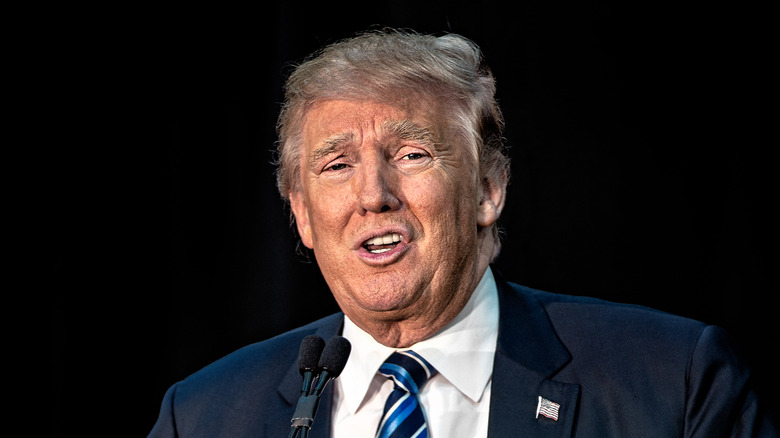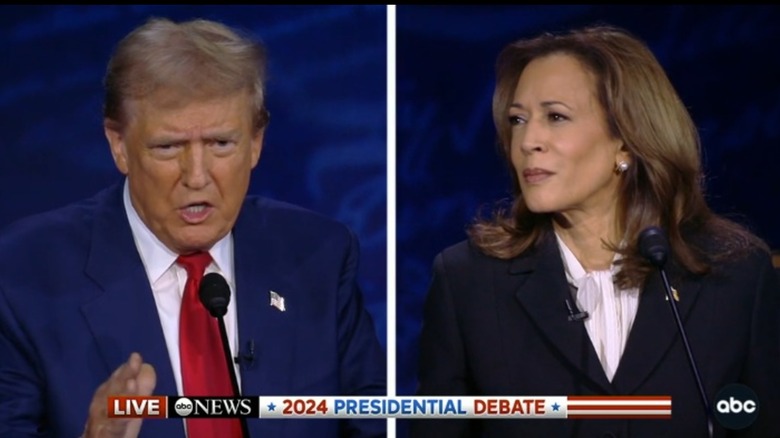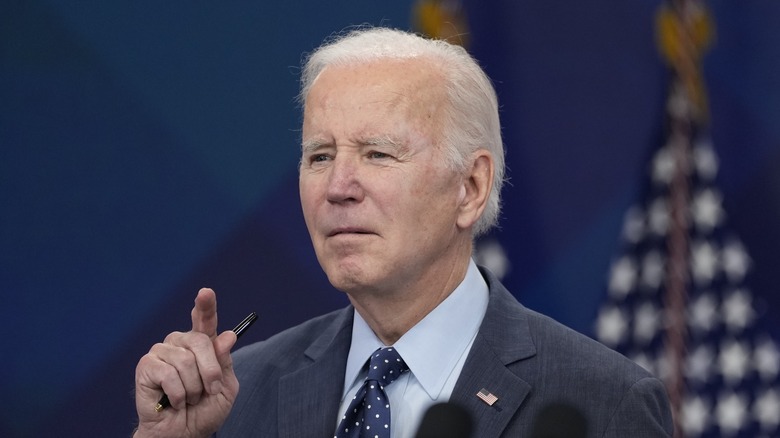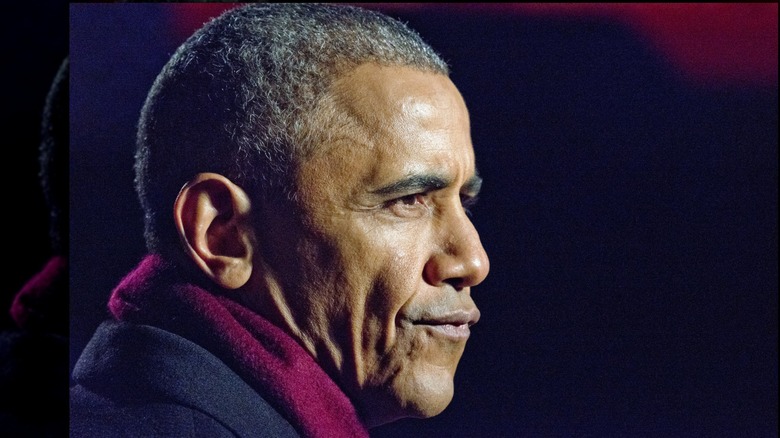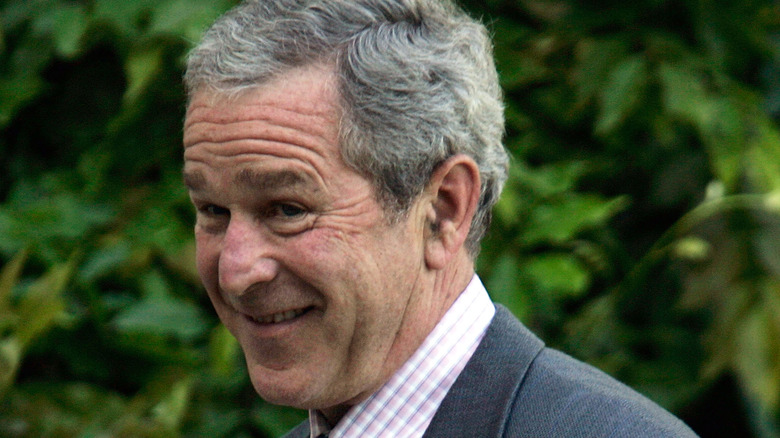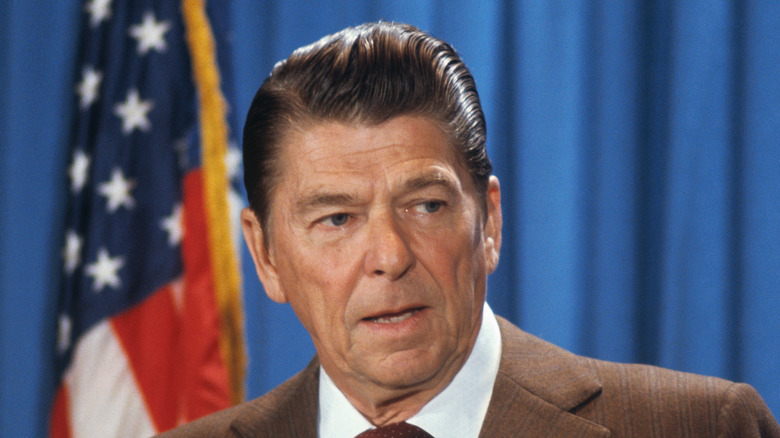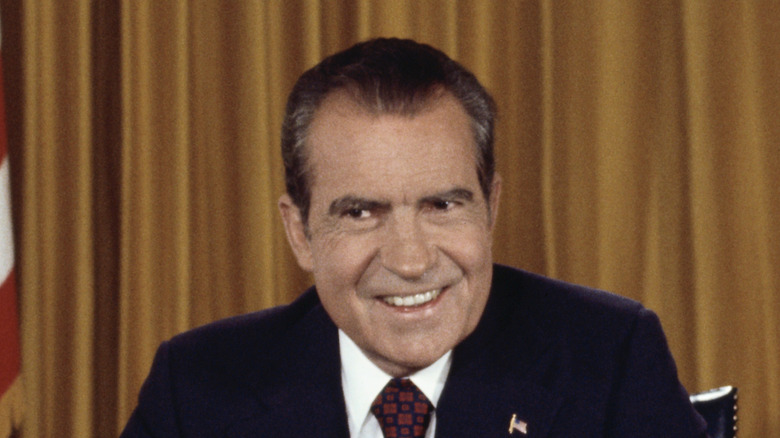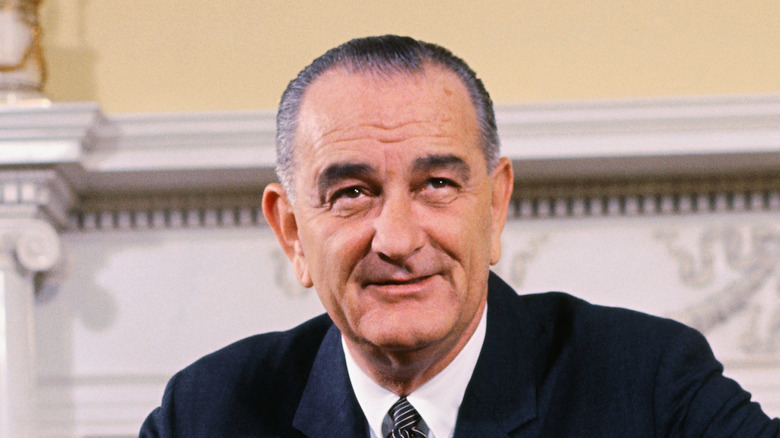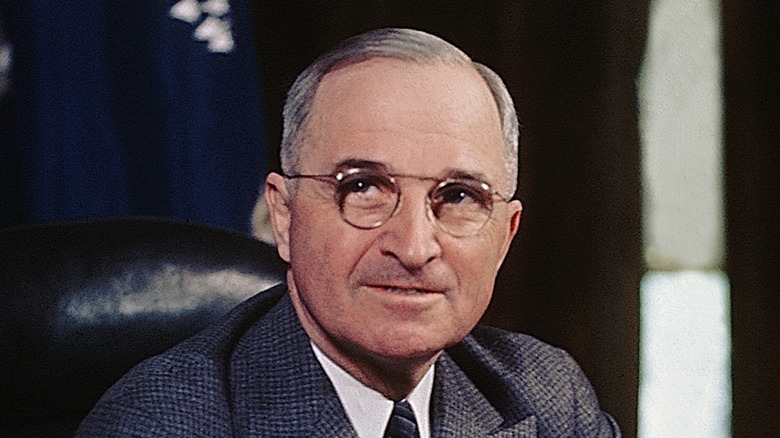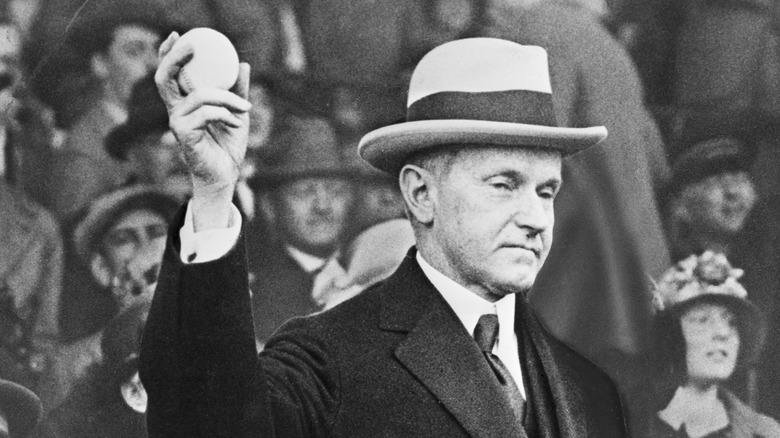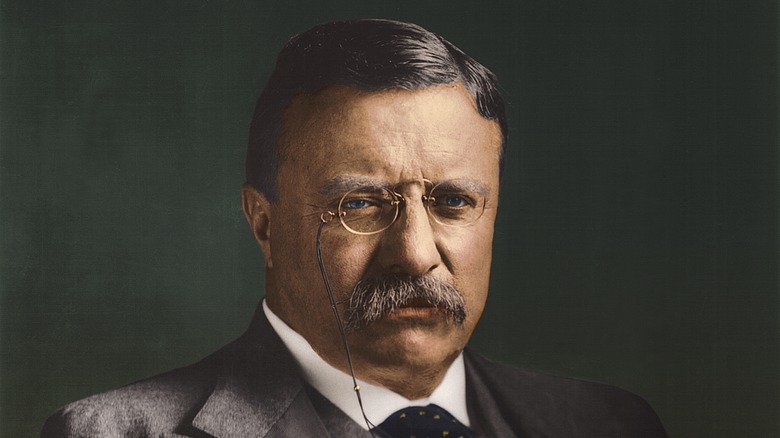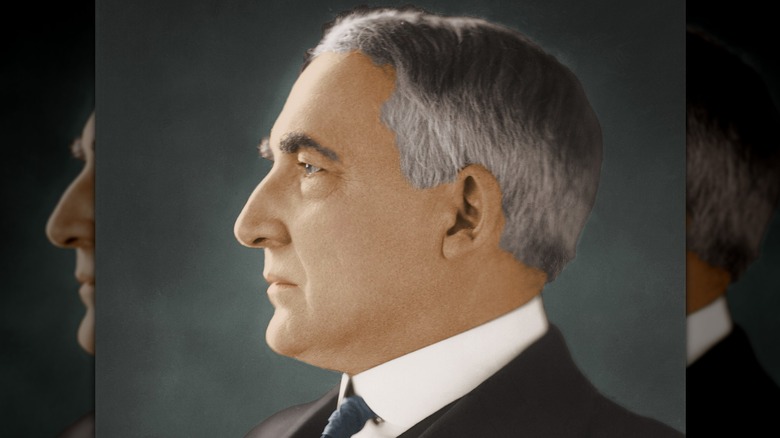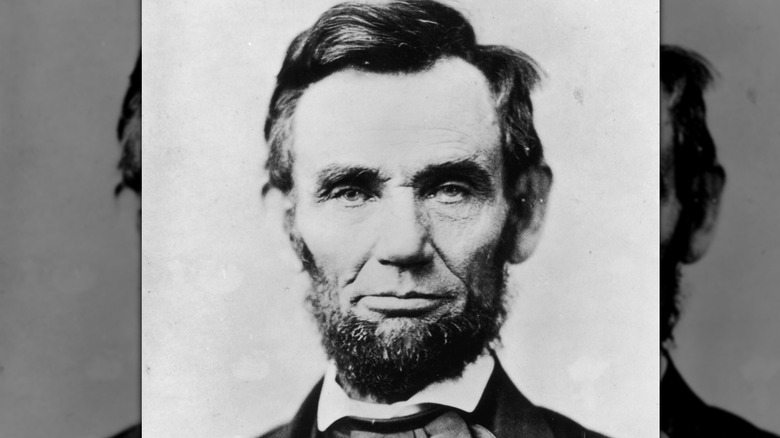The Most Bizarre Things Presidents Have Ever Said
The United States presidency is a leadership position like no other — when presidents speak, the world listens. Many of their utterances have gone down in history, from Abraham Lincoln's Gettysburg Address, Franklin Roosevelt's "four freedoms," and John F. Kennedy's decision to go to the moon (and leave something very cool behind), to Ronald Reagan's demand to Mikhail Gorbachev to "tear down" the Berlin wall.
On so many occasions, the men occupying the highest office in the land have met the moment with carefully crafted speeches that inspire millions. But it hasn't always been the case. Sometimes, they give us a glimpse of just how human (and fallible) they are in their unguarded or unscripted moments.
It's at times like this — especially in the digital age, when someone, somewhere, is always watching — that U.S. leaders open their mouths and put their feet inside. Here's a look at some of the most bizarre things presidents have ever said and why they said them.
Donald Trump
President Donald Trump is an avid user of social media, but just a few months into his first term, a 2017 tweet baffled millions with a single word: "Covfeve." It was part of a short, later-deleted post that read: "Despite the negative press covfefe," (per USA Today) and prompted wild speculation about what it meant. While that remains a mystery, some Trump comments were much clearer, including his wish to "buy" Greenland, telling reporters in 2019, "Essentially, it's a large real estate deal," per The Guardian. Returning to office in 2025, he repeated the request. According to the BBC, Greenland's prime minister said the country was not a "piece of property that can be bought."
The United States was not alone in seeking ways to combat the COVID-19 virus, but one Trump suggestion took everyone by surprise. During a White House daily briefing in April 2020, he asked Bill Bryan, head of the DHS' science and technology division: "I see the disinfectant that knocks it out in a minute, one minute. And is there a way we can do something like that by injection inside or almost a cleaning?" (per NBC New York).
Trump also made some wild claims during his 2024 presidential campaign. One of his strangest occurred during the ABC debate with Kamala Harris, where he repeated a baseless rumor about Haitian immigrants in Ohio. Then-candidate Trump said: "In Springfield, they're eating the dogs, the people that came in, they're eating the cats... They're eating the pets of the people that live there."
Joe Biden
Scranton-born Joe Biden started in politics in 1970 as a member of the New Castle county council and ended in the full glare of the media spotlight as president. The reason? His performance in the 2024 CNN debate against Donald Trump. Biden confused everyone with his reply to a question about immigration. The then-president said: "And I'm going to continue to move until we get the total ban on the — the total initiative relative to what we're going to do with more Border Patrol and more asylum officers."
It wasn't the only word salad Biden ever served up. In 2021, while in New Jersey to promote his infrastructure bill, he quipped to the audience, "As one computer said, if you're on the train and they say Portal Bridge, you know you better make other plans" (via Sky News Australia). The White House later clarified his remarks with a transcript that read: "You know that old expression: 'Time is money.' As one commuter said..."
At least he never insulted anyone, right? Wrong. In 2020, Biden raised eyebrows in a public meeting in New Hampshire, when a college student asked him about his poor showing in the Iowa caucus. He asked if she'd ever attended a caucus, but when she nodded, he shot back, "No, you haven't. You're a lying dog-faced pony soldier" (via The Washington Post). It was a reference to a line from a John Wayne movie and, for some, remains one of the worst things Biden ever said.
Barack Obama
There is no doubting the fact Barack Obama is an intelligent man. After all, he was the first African American president of the Harvard Law School Review, and he worked as a lawyer and teacher. But that doesn't mean he didn't give people the occasional "huh?" moment. In 2008, during a stop in Beaverton, Oregon, on the campaign trail, Obama told the assembled crowd: "I've now been in fifty seven states? I think one left to go" (via ObamaGaffe).
Domestic geography might have eluded him for a moment, but comments about overseas issues also prompted people to wonder, "Did he really just say that?" During a Florida town hall, Obama was asked an important question about human rights violations in Palestine. His reply didn't get off to a good start as he said, "The Middle East is obviously an issue that has plagued the region for centuries" (via the National Archives).
It's one thing for a politician to have a slip of the tongue about states or muddle up foreign history, but it's another to upset the sci-fi crowd by unforgivably mixing the "Star Wars" and "Star Trek" universes. In 2013, Obama did just that talking about getting bipartisan agreement on budget cuts. The then-president told reporters (via The Washington Post), "I'm presenting a fair deal, the fact that they don't take it means that I should somehow do a Jedi mind meld with these folks and convince them to do what's right." The White House joined in the ensuing social media frenzy with the post: "We must bring balance to the Force."
George W. Bush
To many of his supporters, George W. Bush was a capable, effective president. To some historians, he was an "amiable mediocrity" and "handcuffed to the bottom rungs of the presidential ladder" (per iPolitics). Whatever your opinion of the man as a leader, it's fair to say "Dubya" gave everyone plenty to talk about, though not always for the right reasons.
In a 2004 Missouri speech, taking aim at Democrats supporting malpractice lawsuits against doctors, Bush told the crowd, "Too many good docs are getting out of business. Too many OB/GYNs aren't able to practice their love with women all across this country." From single mothers who work hard to "put food on [their] family," and anyone who "misunderestimates" his policies, to knowing that human beings and fish "can coexist peacefully," there are plenty of "Bushisms" to choose from.
The comment that tops many of those amusing lists came in 2002, against the backdrop of tension in the Middle East and suicide bombings in Israel. While holidaying in Maine and before playing a round of golf with his father, the younger President Bush spoke to reporters about the need to "stop the terror." He concluded: "I call upon all nations to do everything they can to stop these terrorist killers. Thank you. Now watch this drive."
Ronald Reagan
Opinions go back and forth about whether Ronald Reagan was a good actor. Some say that, while he was never in the same league as Bogart or Cagney, Reagan held his own. Others suggest he never stopped playing a role, even when occupying the White House. While Reagan clearly knew how to deliver a line, he never did it more memorably than in 1984.
Before his weekly live radio broadcast, the president was asked to say something so the microphone could be checked. He obliged with the following, per Politico: "My fellow Americans, I'm pleased to tell you today that I've signed legislation that will outlaw Russia forever. We begin bombing in five minutes." Although it was never aired, the comment was leaked to the press, causing red faces in the administration and fury from Russia. Official Soviet news agency TASS dubbed Reagan's joke an "unprecedented and hostile attack," though Gorbachev may have eventually seen the funny side.
Reagan was accused at the time of his missile gaffe of being fixated on nuclear strikes. Three years later, while addressing the U.N. General Assembly in New York, he broached another subject close to his heart: aliens. While asking what could help bring humanity together in common cause, Reagan mused: "I occasionally think how quickly our differences worldwide would vanish if we were facing an alien threat from outside this world."
Richard Nixon
It's almost impossible to talk about Richard Nixon and not be immediately drawn into the shenanigans that led to the Watergate scandal and his historic decision to resign in 1974. However, before all that, Nixon made several comments that, knowing what we all know now, made everyone's jaws drop.
In August 1972, when asked about appointing a special prosecutor, the president insisted that "no one in this administration, presently employed, was involved in this very bizarre incident" (per The American Presidency Project). A little over a year later, at a Florida press conference, he stated, "People have got to know whether or not their president is a crook. Well, I'm not a crook" (via NPR). This from the president who once advised an associate: "You don't know how to lie. If you can't lie you'll never go anywhere," per The Washington Post.
It wasn't the only eyebrow-raising statement Nixon ever made. Writing in a 1968 edition of New York Magazine, Gloria Steinem travelled with his presidential campaign. While swapping insights with other journalists, she said one of them claimed Nixon said, "I would have made a good Pope." The debate rages about whether it is true or not, but there's no doubt what Nixon told Watergate insider H.R. Haldeman during a 1973 phone call, "I always wondered about that taping equipment but I'm damn glad we have it, aren't you?" (per Nixon Library).
Lyndon B. Johnson
His presidency began in tragedy but, once in the White House, Lyndon B. Johnson quickly put his own salty spin on proceedings. Many of his forthright quips feature in Robert Caro's book "Master of the Senate: The Years of Lyndon Johnson," including the president's view about having to deliver an economics speech. He said it was "a lot like pissing down your leg. It may seem hot to you, but it never does to anyone else."
There was no doubt for Johnson about what he expected from those he placed in positions of power: loyalty. But for him, that didn't mean just bowing and scraping. It went a lot further, as he once told an adviser, "I want him to kiss my a** in Macy's window at high noon and tell me it smells like roses. I want his p***** in my pocket," per The New Yorker.
The president was never shy about discussing private matters, as a 1964 phone call to his tailor proved. While ordering new trousers, Johnson asks for them to be cut a little bigger "because they cut me; they're just like riding a wire fence." Even after leaving office, he continued to shoot from the hip. Speaking to "Face the Nation," George W. Bush recounted a pearl of wisdom Johnson gave his father: "The difference between the Senate and the House is the difference between chicken salad and chicken s**t."
Harry S. Truman
History has been kind to the presidency of Harry S. Truman, who had faced two assassination attempts by the time he decided not to run for the presidency again in 1952. Yet as the years passed, people saw Truman in a new light, embracing his plain speaking and businesslike approach both to being president and the world of politics.
A lover of music, Truman's quip about choosing whether to be "a piano player in a w****house or a politician," is well known, but what he said next provides the real "what did he say?" quote: "And to tell the truth, there's hardly any difference. I, for one, believe the piano player job to be much more honorable than current politicians" (via Snopes).
Telling it like it was may have been Truman's stock-in-trade, but that didn't mean he was always right when he did it. In fact, in 1950, the president horrified the media at a press conference when asked about North Korea and whether the atomic bomb could be used. Truman replied, "The military commander in the field will have charge of the use of weapons, as he always has" (per The New Statesman). A panicked White House issued a statement underscoring that, as per the 1946 Atomic Energy Act, only the president could make that decision.
Calvin Coolidge
There are presidents who are energetic and dynamic men, and there is Calvin Coolidge. His reputation as "Silent Cal" emerged as vice president, and it stuck with him when he became president after Warren G. Harding's death in 1923. We have a portrait painter to thank for one of Coolidge's oddest quotes. The artist asked how he felt about being elevated to the White House, to which the president deadpanned, "I thought I could swing it" (via the Calvin Coolidge Presidential Foundation).
Coolidge often quipped that nobody could call on him to repeat himself if he didn't say anything, but he did pass on at least one of his thoughts about his job to Ethel Barrymore. "I think the American people want a solemn ass as a President, and I think I shall go along with them," he told her. He also gave advice to his successor, Herbert Hoover, on how to deal with talkative visitors. "If you keep dead still, they will run down in three or four minutes."
Coolidge was in no way eager to return to the White House. By 1932, as the Republican Party eyed him as a better candidate than Hoover, hoping that Coolidge would "be the end of this horrible depression," he told them, "It would be the beginning of mine."
Teddy Roosevelt
Teddy Roosevelt was a larger-than-life occupant of the White House who sought to make life a little better for everyone. That force of personality shone through even before he took office, as demonstrated by a letter he wrote to diplomat David Gray. In it, Roosevelt said: "Somebody has to stand for the things for which I am standing, or else this country will go through one of two equally disagreeable experiences, a smash up or dry-rot" (per Dickinson State University).
Although Roosevelt was popular both as a politician and president, he left the White House after two terms in office as a Republican, only to run again in 1912 as the head of the Progressive Party. That same year, after stalking him over a vast distance, John Schrank shot Roosevelt in the chest at an event in Milwaukee.
According to the Theodore Roosevelt Association, despite having a broken rib, Roosevelt gave a speech, saying, "Fortunately I had my manuscript, so you see I was going to make a long speech, and there is a bullet — there is where the bullet went through — and it probably saved me from it going into my heart. The bullet is in me now, so that I cannot make a very long speech, but I will try my best."
Warren G. Harding
Shakespeare wrote in "Twelfth Night" that "some are born great, some achieve greatness, and some have greatness thrust upon them." President Warren G. Harding, who was elected in 1921 but whose death in 1923 curtailed his White House tenure, fell somewhere between the latter two categories. Although he secured 60% of the popular vote, the man historian Nicholas Murray Butler described in the first volume of "Across the Busy Years" as "good natured, lazy and weak," came to the fore when under pressure from his peers.
The author wrote about finding a "dejected" Harding in his office, faced with around 100 letters to open and read. Butler scoffed that even he didn't stoop to such menial tasks, prompting a startling admission from the president: "I am not fit for this office and should never have been here." In his book, Butler called the statement "very pathetic," potentially getting a glimpse of the depression that saw Harding seek treatment earlier in his life.
Despite the downbeat image and murky world of his presidency, Harding was well liked by the American public, particularly because of his Airedale terrier Laddie Boy, who was regarded as the "First Dog." When journalists asked if they could "interview" the terrier, Harding reportedly said, "I cannot hope to be one of the great presidents, but perhaps I may be remembered as one of the best loved" (per The Ironton Tribune).
Abraham Lincoln
As the man who guided the fractured United States through a bitter civil war and out the other side, history is not short of weighty quotes from President Abraham Lincoln. Despite the heavy burden he shouldered, he did offer a flash of strange wit — sometimes with a barb or two — from time to time.
While sorting through applications for the post of commissioner to the Sandwich Islands in Hawaii, he told the supporters of one candidate whose health was suffering, who they claimed would benefit from the warm weather: "Gentlemen, I am sorry to say that there are eight other applicants for that place, and they are all sicker than your man," via History Extra. As president, although he once pardoned a doll, Lincoln wasn't above putting those already in positions of power in their place.
As well as dubbing politicians "at least one long step removed from honest men," via Lincoln's Writings, he also gave General George B. McClellan short shrift, after the latter's decision not to pursue a weakened General Lee after the Battle of Antietam, and his refusal to follow orders. Lincoln removed him as the head of the Army of the Potomac in 1862. Lincoln reportedly said at the time, "My dear McClellan: If you don't want to use the Army I should like to borrow it for a while" (per Pennsylvania Center for the Book).
